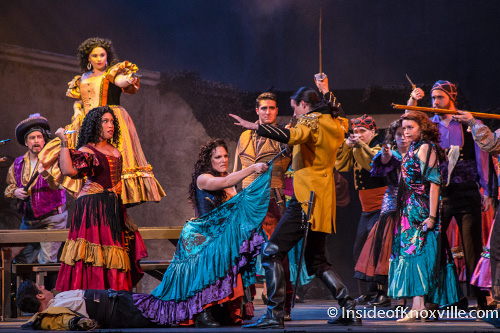A number of productions of Bizet’s Carmen have been in the music news recently, not the least of which is a current production at the Metropolitan Opera in New York with some rather notable casting. While such discussion makes any talk of a particular singer owning a role all the more dangerous and limiting, just such talk surrounds Knoxville Opera’s captivating production of Carmen this weekend. Audrey Babcock, singing the role of Carmen for perhaps her twelfth opera company, submitted an undeniably strong claim for defining how we see that character.
Dramatically, Babcock exuded an obvious comfort level with the role that manifested itself as unconstrained fluidity and confidence in dance and movement—her entrances were real theatrical entrances; her body language projected sexuality and seduction. On a visible level, the stage picture that she projected was a masterful and enthralling description of sultriness and dominance. Vocally, her mezzo-soprano was everything one could want in Carmen—smooth, velvety, and sensually rich, but with an edge of power and heat that threatened to erupt like a volcano without warning. Her beautifully saucy Act I Habanera defined the character and the later Seguidilla proved her power of seduction.
Fortunately, Babcock was just the beginning of this consistently impressive cast. Tenor Brian Cheney sang the role of Don José, the subject of Carmen’s seductive power, with such attractive and supple clarity, expressive detail, and eye-opening power that one hungered to hear more. I was troubled, though, that stage director Chuck Hudson didn’t find a way to separate the character of Don José—visually and symbolically—in crowd scenes, and particularly when in the company of the other soldiers. While the flawed Don José falls victim to Carmen’s seduction on a fundamental sensual level, the character has complexity and intensity, and shouldn’t necessarily be seen merely as a translucent and reticent victim physically overshadowed.
Soprano Zulimar López-Hernández, seen before by Knoxville audiences as Juliette in the 2012 production of Gounod’s Roméo et Juliette, needed no assistance in standing out as a lovely Micaëla. Ms. López-Hernández’s voice seemed made for the role, light and lyrically luscious, but with a penetrating strength that effortlessly supports her phrasing.
The role of Escamillo, the toreador that is toyed with by Carmen, was sung by Ryan Kuster, a handsome bass-baritone with a rich voice and a commanding stage presence.
A plus for this production was an exceptional roster of acting singers in secondary roles. Emily Hagens and Briana Hunter brought energy, freshness, and character depth, not to mention captivating vocal performances, to the roles of Frasquita and Mercedes, respectively—as did Mattia D’Affuso and Thaddeus Ennen to the roles of smugglers Dancaïre and Remendado. Bass Peter Johnson, a face and voice happily familiar to Knoxville audiences, gave the role of army lieutenant Zuniga assertiveness and attitude.
The production’s rented set and costumes—attractive, but in overly saturated colors—strayed somewhat from the idea of the warm sun-drenched Seville locale where heat and light are motivating forces that directly drive crowd action and symbolically reinforce the opera’s heated sensuality. Unhappily, this weak point in stage direction also left the excellent Knoxville Opera Chorus, which made up the ranks of factory girls, smugglers, soldiers, and plaza crowds, with the burden of selling the locale and atmosphere with only limited movement and strangely gratuitous details.
Maestro Brian Salesky, at the helm of the Knoxville Symphony Orchestra, guided the pace with attention to orchestral detail and an ear for crispness. And an interesting addition by Salesky was the interpolation of appropriate Bizet works as entr’act music to accommodate scenery changes.
Update: A previous version of this review misspelled the name of mezzo-soprano Briana Hunter.
Photograph courtesy of Urban Guy at InsideofKnoxville.com








